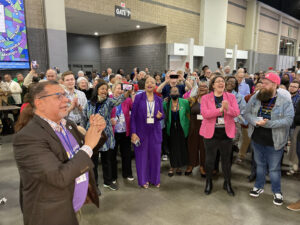
WICHITA, Kan. (BP) – When Debbie Evert’s “bonus Dad” Dale Rich died during the COVID-19 pandemic, she wasn’t allowed in his room. She describes the funeral “as just a small handful of folks at the mortuary,” followed by a graveside service.
“If things had been normal, we would have been at Immanuel (Baptist Church) in the big auditorium … and we would have had a big celebration.” The service “was very meaningful. It was very good and true, but we would have had something so much larger, because he was certainly worth celebrating and such.”
That’s why she and her mom Barbara Rich registered Dale’s name for the Dec. 3 Coronavirus Memorial Service at Immanuel Baptist Church.
“I think part of why mom wanted to go, is just to celebrate with other people his life and remember him,” Evert said. “They were married almost 35 years.”
The service is designed to give Sedgwick County, Kansas families a chance to memorialize loved ones who died during the pandemic — either from COVID or other illnesses — when public gatherings were restricted, Immanuel Senior Pastor David Crowther told Baptist Press.
“We saw a need in many families where they had lost loved ones due to COVID during the last couple of years, and they were unable to have a fitting celebration-of-life service for their loved ones,” Crowther said. “A lot of people did not have the closure they needed when their loved one passed away.”
Survivors had registered at least 50 names as of Thursday morning (Dec. 2) to be memorialized during the event. Each person’s name will be read aloud, each recognized with a separate lighted candle. Crowther will preach a Gospel sermon and offer counseling for both salvation decisions and grieving.
Sedgwick County has suffered 881 deaths from COVID in the pandemic that has infected 71,709 residents there, according to the Sedgwick County Health Department’s data dashboard (https://www.sedgwickcounty.org/covid-19/). Health concerns, financial constraints and restrictions on gatherings made it difficult for families to hold funerals, no matter the cause of death, Crowther said.
“It really is an attempt to reach our community and our entire city in a way that we feel uniquely qualified to do,” he said, “because if the church doesn’t have something to say about life and death, I don’t know who does. So we just feel the church needs to be speaking about these issues.
“Everybody was thinking more about death than in many years in our nation.”
COVID-19 has killed nearly 783,000 in the U.S. and more than 5.2 million globally, but Crowther expresses a desire to remember the people in the count, not just the numbers.
“No one’s talking about the actual individual who died,” Crowther said. “They become a number and a statistic. We just really want to try to have this service in a way that we don’t focus on vaccines, or masks or policies, but on people.”
Before Rich suffered a stroke, he had been Barbara’s caregiver. His illness meant both had to be confined to a nursing home months before his death, Evert said.
Evert had in Rich a “bonus Dad” who never showed a difference in his care between her and his two biological daughters, according to Evert. Experiencing his death was so different for Evert than when her biological father died in 1983.
“It was a really rough experience,” Evert said. “My dad died in ’83 and we had a huge celebration of life for him. The church was packed full, the same church, was packed full. And this time with Dale, it was just a small handful of folks at the mortuary.
“That’s not enough for me,” Evert said, “so I’m glad David has offered this to the church, to the city, so that we can celebrate these lives. I think it will be very meaningful.”
















